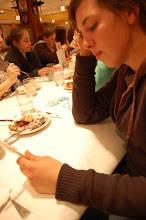I lived in California, and I was homeschooled. Let's file me.
You lived in California- Check one of the following=
- Movie star
- Valley girl
- Surfer
- From the O.C.
You were homeschooled- Check all that apply=
- Nerd
- Denim skirts
- Complete homework in pajamas while eating cookies.
- Nerd
Somehow the above don't mix, I don't fit any of the descriptions (maybe nerd), and I become unclassifiable. Or, the exception.
"Other Californians I've met were stuck up, but not you."
"You're cool, tell your parents they did a good job, you're not like other homeschoolers."
Other.
Whose the other, the generalization? The generalized individual. The more I meet people from groups I have generalized, the less I can classify them.
Brother Mike was my other. He begged at the corner of our intersection in California. He asked my dad for a dollar once to get a hotdog.
I was afraid of him. He was homeless, he wanted my money, he had a mental impairment...he was dangerous.
One day we were trying to cross the street quickly because Brother Mike was coming toward us. We had a whole envelope full of money. We were selling lollipops to fundraise for my brother's wrestling team.
We almost got hit by a car in our attempt to get away from Brother Mike. He shouted to us from across the street. "You kids be careful okay? You almost got yourselves killed!" And kept walking.
It blew my mind, and destroyed my stereotype.
I have been reading the book Race by Studs Terkel. In one of his interviews he talks to a woman who has become bigoted in her opinions of African Americans because of her experiences in law enforcement. At one point, Terkel asked her about her friends that were black, she replies:
"They're exceptions. Absolutely. And all the people from my church. It's ninety-five-percent black."
His follow-up question concerns her colleagues, she replies:
"--Are exceptions. Oh absolutely."
Were these people exceptions? Or were they just the people who got to tell her their story?
Everyone has a story, a story of fallenness... no matter what race or gender.
Everyone sees the world through a lens based on their story, and each of our lenses is cracked and irreparably scratched by sin.
It is difficult to generalize when we begin to hear the stories of the other.
Jesus took the time to love people, because He already knew their stories. He reached out to the generalized, the downtrodden... the ones without a voice because, "We all know what those people are like, we know their kind Jesus."
Zacchaeus. Tax collector. "We know him Jesus. He rips us off on every tax return."
Jesus replies, "Zacchaeus, make haste and come down, for today I must stay at your house."
Adultress. About to be stoned by the religious leaders. "We know her Jesus. She has sinned against the community, and against You."
Jesus replies, "He who is without sin among you, let him throw a stone at her first."
To the woman, Jesus says, "Go and sin no more."
Every criminal has a story of sin. As well as every churchman, every atheist, every child.
C.S. Lewis' classic devil Screwtape says, "It does not matter how small the sins are, provided that their cumulative effect is to edge the man away from the Light and out into the Nothing. Murder is no better than cards if cards can do the trick. Indeed the safest road to Hell is the gradual one—the gentle slope, soft underfoot, without sudden turnings, without milestones, without signposts."
We all are on a slope to hell, whether gentle or steep, until Jesus steps in.
I wish I took more time to hear people's stories, rather than assume I knew who they are based on the color of their skin, their clothing, their neighborhood, their education, their political associations, their church denomination, etc.
I am hopeful that my generalizations, my stereotypes, can be destroyed. But only if I get to know the other.
If we all get to know the others in our lives, maybe we would hurt each other less, and love each other more.
If someone says, "I love God," and hates his brother, he is a liar; for he who does not love his brother whom he has seen, how can he love God whom he has not seen? And this is the commandment we have from Him: that he who loves God must love his brother also. 1 John 5:20-21

2 comments:
oh my. this is very good.
hey Abby! I'm glad you found me! I look forward to reading your blog now...
this topic has been bugging me a lot this past semester. being at Fresno Pacific has opened my eyes to these stereotypes and to the frustration that now ensues. it's like, now there's no "normal". so should we even be comparing things/people to other things/people. meh.
oh life.
well done!
wow...well written. Lot of wisdom here...thanks for being a theologian Abby, keep sharing with us.
Post a Comment